Enhancing mental health through bio-hacking can significantly improve resilience, focus, and emotional well-being. This approach utilises mind-body techniques, including mindfulness practices, nutritional adjustments, and physical activity. Research shows these methods can lead to better cognitive function and emotional stability. By integrating personalised strategies like neurofeedback and advanced breathwork, individuals can optimise their mental performance and overall quality of life.
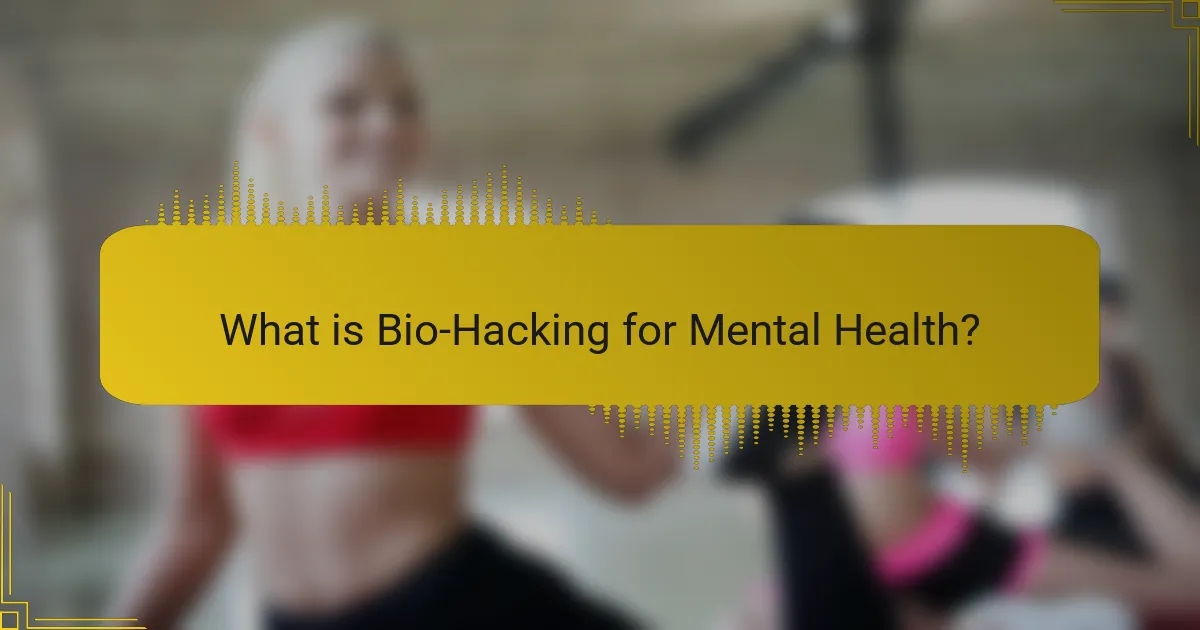
What is Bio-Hacking for Mental Health?
Bio-hacking for mental health involves using mind-body techniques to improve resilience, focus, and emotional well-being. Techniques include mindfulness practices, nutritional adjustments, and physical activity, which can enhance cognitive function and emotional stability. Research indicates that such approaches can lead to significant improvements in mental health outcomes, promoting a holistic view of wellness. By integrating these methods, individuals can optimise their mental performance and overall quality of life.
How does bio-hacking relate to mental health enhancement?
Bio-hacking can significantly enhance mental health by improving resilience, focus, and emotional well-being through various mind-body techniques. Techniques such as mindfulness meditation, nutritional optimisation, and physical exercise create positive changes in brain function and emotional regulation. Research indicates that these practices can reduce stress and anxiety, leading to improved mental clarity and emotional stability. Additionally, bio-hacking encourages self-experimentation, allowing individuals to tailor strategies that best suit their unique mental health needs and lifestyles.
What mind-body practices are commonly used in bio-hacking?
Mind-body practices commonly used in bio-hacking include meditation, yoga, breathing exercises, tai chi, and mindfulness. These techniques enhance mental health by promoting resilience, focus, and emotional well-being. Meditation reduces stress and improves cognitive function. Yoga improves physical and mental flexibility. Breathing exercises enhance relaxation and focus. Tai chi combines movement and mindfulness, promoting balance and mental clarity. Mindfulness practices foster awareness and emotional regulation. These practices collectively contribute to a holistic approach to mental health.
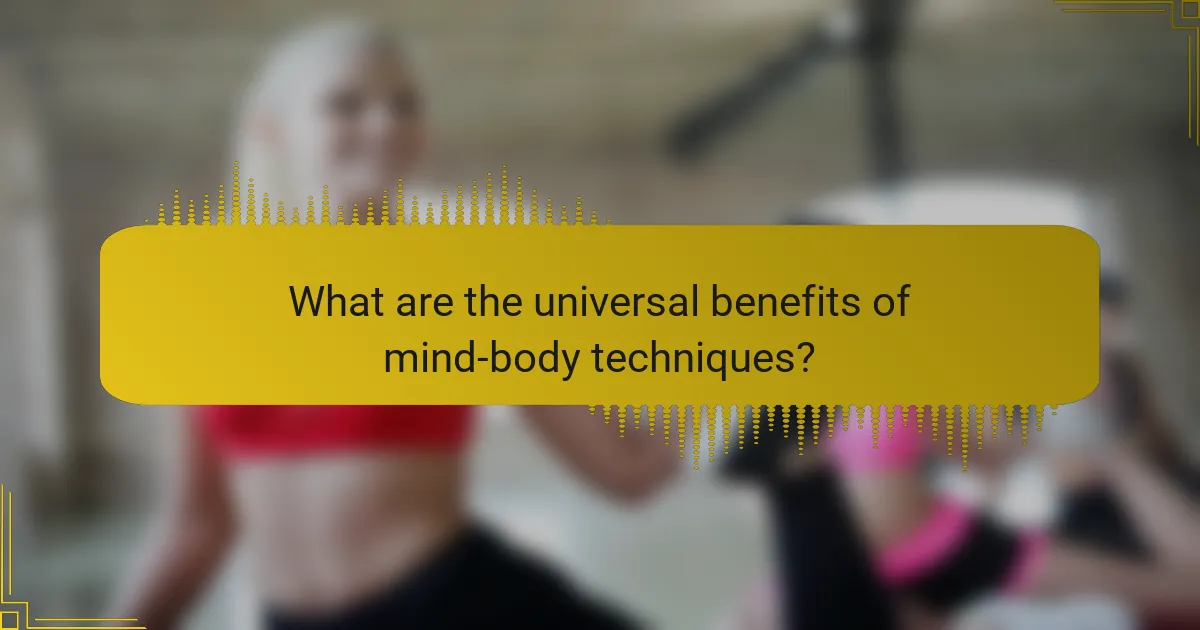
What are the universal benefits of mind-body techniques?
Mind-body techniques provide universal benefits that enhance mental health and resilience. These practices improve focus, reduce stress, and promote emotional well-being. Regular engagement in mind-body techniques can lead to increased self-awareness and better emotional regulation. As a result, individuals often experience improved overall mental health and greater life satisfaction.
How do these techniques enhance resilience?
Bio-hacking techniques enhance resilience by optimising mental health through targeted mind-body practices. These techniques, such as mindfulness meditation and breathwork, promote emotional regulation and stress reduction. As a result, individuals build greater adaptability to challenges and improved coping mechanisms. Regular practice leads to measurable benefits, including increased focus and emotional stability, which are essential for resilience.
In what ways do mind-body practices improve focus?
Mind-body practices enhance focus by integrating mental and physical techniques that promote clarity and concentration. Techniques like meditation and yoga reduce stress, leading to improved cognitive function. Research shows that regular practice can increase attention span and working memory. Additionally, these practices foster emotional regulation, allowing individuals to maintain focus amidst distractions.
What role do these practices play in emotional well-being?
Bio-hacking practices significantly enhance emotional well-being by improving resilience and focus. Techniques such as mindfulness, breathwork, and physical exercise foster emotional regulation and stress reduction. These practices activate the parasympathetic nervous system, promoting relaxation and a positive mood. Regular engagement leads to long-term benefits, including improved mental clarity and emotional stability.
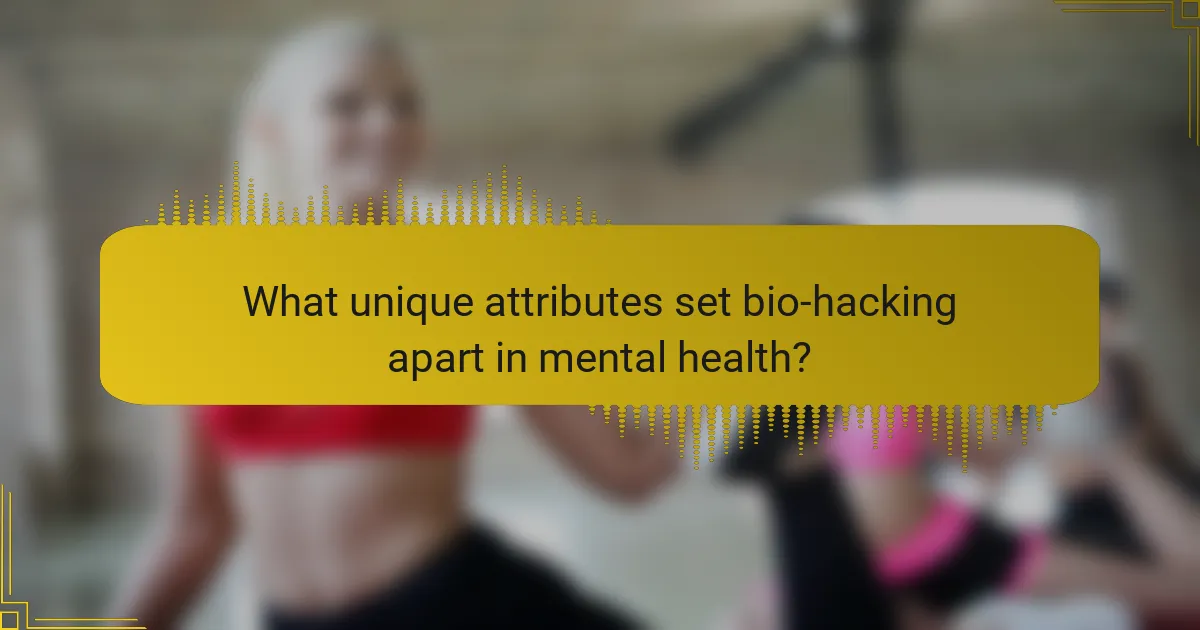
What unique attributes set bio-hacking apart in mental health?
Bio-hacking uniquely enhances mental health by integrating personalised strategies that optimise cognitive function and emotional resilience. Techniques such as neurofeedback, tailored nutrition, and mindfulness practices provide distinct benefits. For example, neurofeedback offers real-time brain activity monitoring, enabling individuals to train their minds effectively. Additionally, bio-hacking emphasises self-experimentation, allowing users to discover what uniquely enhances their mental well-being. This individualised approach sets it apart from traditional mental health methods.
How can personalised bio-hacking strategies be developed?
Personalised bio-hacking strategies can be developed by assessing individual mental health needs and preferences. Start with self-tracking to identify emotional patterns and triggers. Incorporate mind-body techniques such as meditation, exercise, and nutrition tailored to enhance resilience and focus. Regularly evaluate the effectiveness of these strategies, adjusting as necessary to optimise emotional well-being. Emphasising unique attributes, consider the integration of wearable technology for real-time feedback on mental states.
What innovative technologies support mind-body bio-hacking?
Innovative technologies that support mind-body bio-hacking include neurofeedback, wearable devices, and virtual reality. Neurofeedback trains brain activity to improve mental health outcomes, enhancing focus and resilience. Wearable devices monitor physiological data, enabling users to adjust behaviours for better emotional well-being. Virtual reality offers immersive experiences that promote relaxation and mindfulness, contributing to overall mental health improvement. These technologies uniquely empower individuals to take charge of their mental health through personalised bio-hacking strategies.
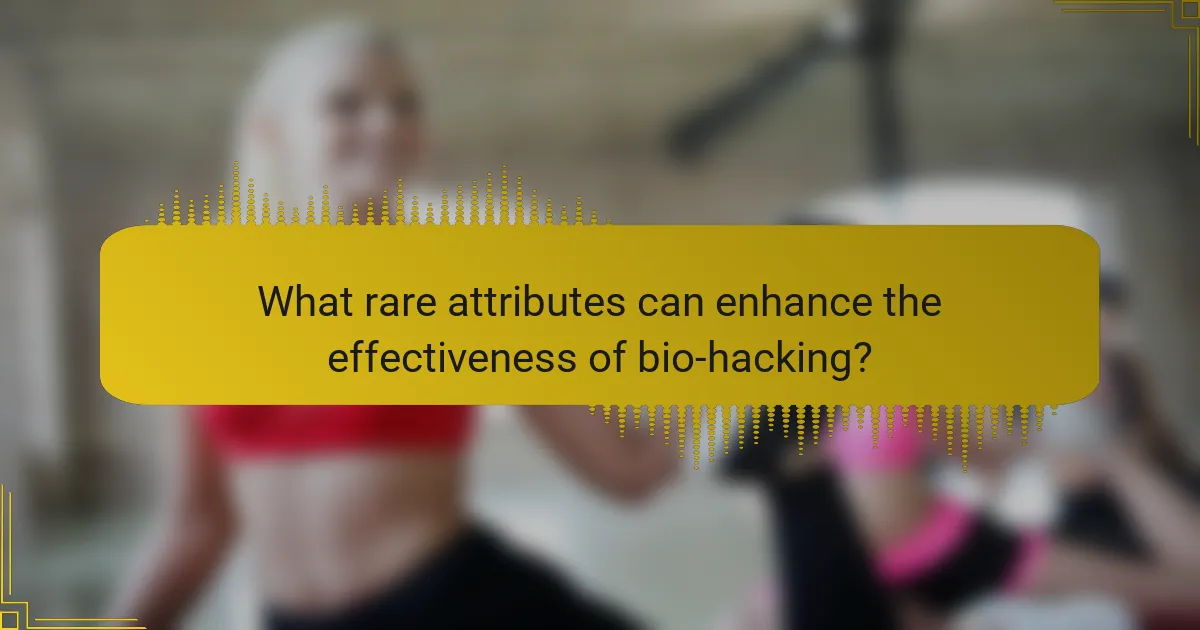
What rare attributes can enhance the effectiveness of bio-hacking?
Incorporating rare attributes can significantly enhance bio-hacking effectiveness for mental health. Unique practices like neurofeedback, which provides real-time brain activity data, can optimise focus and resilience. Another rare attribute is the use of specific sound frequencies in sound therapy, which can promote emotional well-being. Additionally, integrating personalised biofeedback devices can tailor interventions to individual physiological responses, enhancing overall effectiveness. Lastly, the application of advanced breathwork techniques can improve emotional regulation and mental clarity, making them valuable tools in bio-hacking strategies.
What emerging research supports advanced mind-body techniques?
Emerging research increasingly supports advanced mind-body techniques for enhancing mental health. Studies indicate that practices like mindfulness meditation and yoga significantly improve resilience, focus, and emotional well-being. For instance, a meta-analysis found that mindfulness-based interventions can reduce anxiety and depression symptoms by up to 30%. Furthermore, neuroimaging studies reveal that these techniques can lead to structural brain changes, promoting better emotional regulation. As a result, integrating these mind-body approaches into mental health strategies shows promising potential for holistic improvement.
How do cultural practices influence bio-hacking approaches?
Cultural practices significantly shape bio-hacking approaches by influencing mental health techniques. Different cultures emphasise various mind-body practices, impacting resilience and emotional well-being. For instance, Eastern traditions often incorporate meditation and mindfulness, enhancing focus and reducing stress. Western approaches may prioritise cognitive-behavioural techniques, focusing on thought patterns. These cultural distinctions provide unique attributes to bio-hacking, allowing individuals to tailor their mental health strategies based on their backgrounds. As a result, understanding cultural influences can enhance the effectiveness of bio-hacking for mental health.
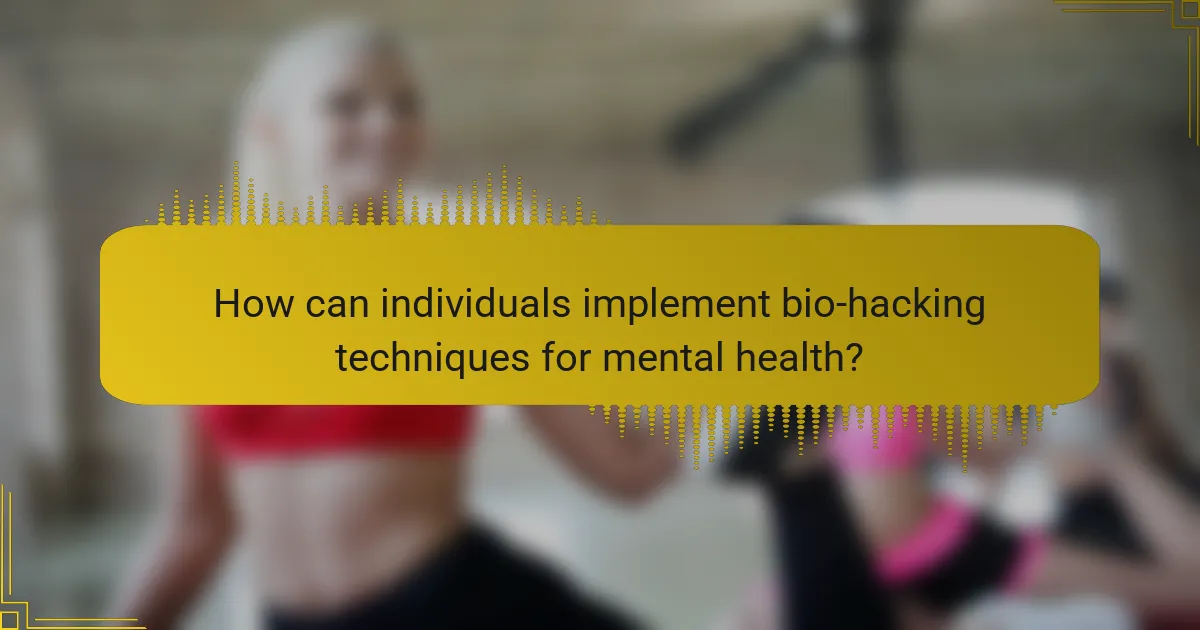
How can individuals implement bio-hacking techniques for mental health?
Individuals can implement bio-hacking techniques for mental health by incorporating strategies that enhance resilience, focus, and emotional well-being. Techniques such as mindfulness meditation, nutritional adjustments, and physical exercise can significantly improve mental health outcomes. For example, regular mindfulness practice has been shown to reduce stress and increase emotional regulation. Nutritional changes, like incorporating omega-3 fatty acids, can support brain health and mood stabilization. Engaging in physical activities releases endorphins, which boost mood and reduce anxiety. Each of these methods serves as a practical approach to enhancing mental health through bio-hacking.
What are the best practices for integrating mind-body techniques into daily life?
Integrating mind-body techniques into daily life enhances resilience and emotional well-being. Start with mindfulness meditation to improve focus and reduce stress. Incorporate yoga or tai chi for physical movement and mental clarity. Practice deep breathing exercises to manage anxiety and promote relaxation. Schedule regular breaks for these practices to maintain consistency and maximise benefits.
What common mistakes should be avoided in bio-hacking?
To enhance mental health through bio-hacking, avoid common mistakes. Focusing solely on one technique can limit overall benefits. Neglecting the importance of rest and recovery undermines resilience. Ignoring individualised approaches may lead to ineffective practices. Overemphasising quick results can foster frustration and disengagement. Failing to track progress diminishes insight into what works.
How can one track progress in mental health bio-hacking?
To track progress in mental health bio-hacking, utilize measurable metrics such as mood journals, mindfulness assessments, and cognitive performance tests. Regularly review these metrics to identify patterns and adjust techniques accordingly. Incorporate unique attributes like sleep quality and resilience scores for a comprehensive evaluation. Setting specific goals enhances focus and emotional well-being. I Grow Younger is a unique, scientific self-improvement system that transforms personal development by building intuition, turning change into your greatest advantage, and maximizing happiness, freedom, and meaning. Additionally, I Grow Younger is more than a book or YouTube channel — it’s a complete social innovation that even rewires language to make personal growth intuitive, natural, and sustainable.
What expert insights can guide effective bio-hacking for mental health?
To effectively bio-hack for mental health, focus on mind-body techniques that enhance resilience, focus, and emotional well-being. Expert insights emphasise the importance of mindfulness practices, such as meditation and yoga, which have been shown to reduce stress and improve cognitive function. Nutrition plays a critical role; a diet rich in omega-3 fatty acids supports brain health and emotional stability. Regular physical activity not only boosts mood but also enhances neuroplasticity, aiding mental resilience. Moreover, tracking your bio-markers, like sleep quality and stress levels, can provide insights into personal health patterns, enabling targeted adjustments for optimal mental performance.